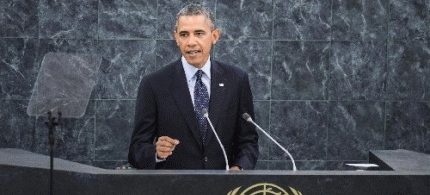With the blessing of the New York Times, the Obama administration has succeeded in cementing a dubious conventional wisdom about the Syrian government's alleged use of chemical weapons last Aug. 21 -- without presenting a shred of actual evidence.
In a front-page story co-written by Michael R. Gordon, who also co-wrote the infamous "aluminum tube" article falsely accusing Iraq of building nuclear centrifuges in 2002, the Times included the U.S. allegations about Syria's chemical weapons use into its storyline as flat fact, not a point in serious dispute.
The story continues in that vein, accepting as indisputable fact that the Syrian government was behind the Aug. 21 attack on a suburb of Damascus despite significant doubts among independent analysts, UN inspectors and, I'm told, U.S. intelligence analysts.
Indeed, the reported lack of consensus in the U.S. intelligence community helps explain why a four-page U.S. "Government Assessment" of the incident was released on Aug. 30 not by the Director of National Intelligence but by the White House press office and was touted not by the DNI but Secretary of State John Kerry. The U.S. government's white paper contained no evidence to support its assertions blaming the government of President Bashar al-Assad.
Though the Aug. 21 incident brought the United States to the brink of another Middle East war, the Obama administration has refused over the past two months to release any proof that it claims to possess, such as communications intercepts, images of rocket launches or even the basis for its precise count, "1,429," of those supposedly killed by Sarin gas.
The U.S. government has even denied U.S. congressman Rep. Alan Grayson, D-Florida, access to the supposed evidence under-girding President Barack Obama's request for authorization to use force against Syria, a proposal that is now in abeyance pending Syria's compliance with a Russian plan for destroying Syria's stockpile of chemical weapons.
Grayson, who has publicly questioned why the administration insists on withholding its evidence, was informed by the House Intelligence Committee that he would not be allowed to look at the intelligence because he gave an unrelated floor speech citing published charts about National Security Agency spying that were leaked by ex-NSA contractor Edward Snowden.
The committee chairman, Rep. Mike Rogers, R-Michigan, also justified the denial, in part, because Obama's request to use force is not currently before the House. According to an article in Politico, Rogers said requests to review intelligence information are weighed against "the sensitivity to the national defense or the confidential conduct of the foreign relations of the United States of the information sought ... the likelihood of its being directly or indirectly disclosed [and] the jurisdictional interest of the member making the request."
However, there remains the distinct possibility that the fluid developments in Syria could suddenly put Obama's war resolution back before Congress amid demands for an immediate up-or-down vote, while leaving no time for a careful review of the dubious casus belli.
Time for Examination
In the heat of a new war fever, there would be little patience for unwinding the conventional wisdom blaming the Aug. 21 attack on the Syrian government. That's especially true now that the New York Times and much of the mainstream U.S. news media has accepted the allegations as indisputable truth.
Ideally, the careful scrutiny that a case for war should demand would come when passions are tempered -- as they are now -- not at their hottest. But the Obama administration, the House Intelligence Committee and, indeed, the major U.S. news media seem to believe that the public and even members of Congress should just fall in line.
Over the past two months, I've heard repeatedly that the public shouldn't expect to see the intelligence that justifies war despite the bitter and bloody experience of the Iraq invasion (not to mention a long and sorry history of other U.S. government lies and propaganda justifying wars).
President Obama has a curious understanding of the word "transparency," by which he seems to mean: keeping the public in the dark and giving a peek at the "evidence" only to officials who won't ask any tough questions. Though he is not the first president to obsess over secrecy, some presidents have shown more respect for American and world public opinion, even if that requires sacrificing some modest intelligence advantage.
Think of President John Kennedy exposing the U-2's high-resolution-photo capabilities to show the world the Soviet missiles in Cuba in 1962; President Ronald Reagan revealing the U.S. ability to intercept Soviet air communications after the KAL-007 shoot-down in 1983; even President George W. Bush authorizing Secretary of State Colin Powell to reveal phone intercepts in support of the Iraq invasion in 2003. Granted, some of those revelations (like the KAL-007 and Iraqi intercepts) were doctored to make a propaganda case, but exposure of the intelligence capabilities was real.
It's hard to believe that the Obama administration's sources and methods regarding the Aug. 21 incident are any more sensitive than the intelligence techniques released by earlier presidents. The world surely knows that the United States can intercept phone calls and has satellites that can record both visual and infrared images with great precision.
(Note: You can view every article as one long page if you sign up as an Advocate Member, or higher).






